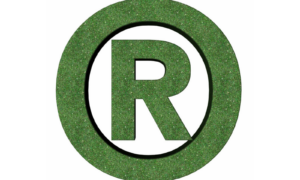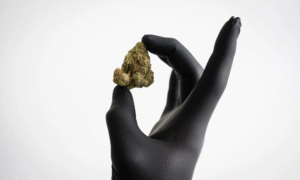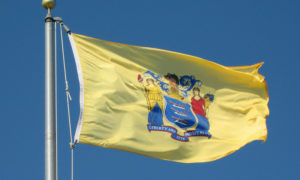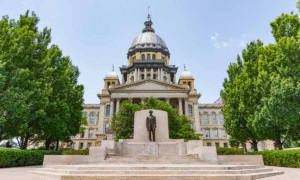
Ken LaRoe, founder, board chairman and CEO of the holding company First GREEN Bancorp.
Florida’s First GREEN Bank has taken on a risk that most other banks have refused: opening accounts for medical marijuana dispensaries and the lawyers, doctors, and vendors that serve them.
“Any company that thinks they are going to have a problem because of their affiliation, we’ll bank them,” said Lex Ford, senior vice president of First GREEN Bank’s medical marijuana division. “We will take on accounts from any ancillary business that is affected by the medical marijuana industry.”
Conflict between state and federal pot laws has long made it difficult for state law-sanctioned marijuana businesses to find banks willing to accept their money.
“The banks are concerned that if the federal government starts prosecuting drug crimes aggressively or the new administration takes a different enforcement position than the last administration, then they could be seen to be facilitating drug crimes,” said William Shepherd, a partner with Holland & Knight in West Palm Beach, and formerly Florida’s statewide prosecutor.
Banks are required to report any suspicious activity on accounts to federal regulators. Legalized marijuana businesses don’t just qualify, they rate their own type of Suspicious Activity Report (SAR). Bank anti-money laundering experts say the reporting and monitoring required for such accounts is onerous and comes with the specter of an investigation targeting not only the account, but potentially endangering the bank’s charter.
Most banks have decided the business isn’t worth it.
“The fundamental issue for them to grapple with is, ‘Yeah I filed a SAR, but am I supporting a business that the federal government is going to continue to say is illegal?’ Until banks get some stronger guidance from their federal regulators, they have to wade into it very carefully, if they go into it at all,” Shepherd said.
The bank’s concerns also affect lawyers and other providers who have significant deposits from clients in the legalized marijuana sphere.
“You could have trouble if a large national bank determines that you are a marijuana-related business—you are likely to have your account shut down,” said Keith Bell, managing partner of the Tallahassee office of Clark Partington Hart Larry Bond & Stackhouse. “There could be a SAR filed on your account that you as a customer of a bank may not even be aware of,” said Bell, whose practice includes representing financial institutions and some legalized marijuana-related businesses.
Drawing a line on loans
First GREEN Bank, founded in 2009 in Eustis, started courting medical marijuana dispensaries early last year and landed its first legalized marijuana accounts about a year ago. The bank now counts six of the seven licensed dispensaries in Florida as clients, plus a few dozen more accounts for indirectly related businesses such as lawyers, doctors, marketing companies and fertilizer providers that serve the industry. (Physicians, especially, tend to prefer a separate account for their medical marijuana-related business.)
The legalized marijuana industry and its periphery now amount to about 5 percent of First GREEN Bank’s $650 million in assets, Ford said. The bank doesn’t currently have any legalized marijuana-related accounts from outside the state, but Ford said growing outside the state along with their customers is part of the bank’s medium-term plan.
To ensure compliance with federal guidelines, the bank collects business ownership information when clients open an account and then monitors for changes. It also plans to tour client facilities multiple times a year. In the case of medical marijuana centers, the bank can monitor day-to-day transactions to make sure they match with deposits.
The bank also employs a Bank Secrecy Act analyst to monitor its marijuana-related accounts, which are maintained separately from those of mainstream bank clients. When money is wired in, the client may get called and questioned about the money’s source and purpose. Money from dispensaries is picked up via armored car and taken directly to the Federal Reserve so that it doesn’t commingle with other money at the bank, Ford said.
Account holders are made aware at the outset that there is a state-required kill switch—if there is a problem or a change in federal administration policy, the account may be shut down within 24 hours.
“A normal client would not put up with what we require of these customers,” Ford said.
Ford wouldn’t disclose how much more the bank charges for so much additional monitoring and services, but he said medical marijuana treatment centers pay a dramatically higher flat fee, with additional costs for each dispensary they open.
“They’re proceeding forward knowing the risks and the rewards. It could be very large rewards,” said Alex Sanchez, president, and CEO of the Florida Bankers Association. “It’s a legal business now, both the state and federal government have to reconcile their differences with this new medical marijuana.”
First GREEN Bank is approaching $550 million in loans and grew its loan portfolio by $24 million in July, but it isn’t making loans to the marijuana industry.
“Once you have advanced the money for a loan, it’s there until its paid off,” Ford said. “There would be no exit strategy on a loan if the feds came in and cracked down, and in a worst case, if the feds came in and decided to enact federal forfeiture, our collateral for the loan would be compromised.”
In the past, keeping the industry completely out of the banking sector forced dispensaries in other regions of the country to stash money in guarded warehouses. Employees, utilities, rent and even their taxes were paid in stacks of cash.
To First GREEN Bank founder and holding company CEO Ken LaRoe, forcing dispensaries to stockpile cash in private vaults is a risk to public safety.
LaRoe initially started First GREEN nearly a decade ago with a focus on environmental sustainability, after selling his first bank, Florida Choice, in 2006. A family experience with medical marijuana eventually helped persuade him to offer services to marijuana-related clients and take on those added risks, he said.
LaRoe’s wife developed a seizure disorder after suffering a traumatic brain injury in a 2010 bike crash. It was medical marijuana that cured her and enabled her to gradually get off of seizure medication, he said. It also helped his father, who suffered seizures after a stroke, he said.
“To me and my family it has been a miracle botanical,” LaRoe said.
Link – Daily Business Review




































